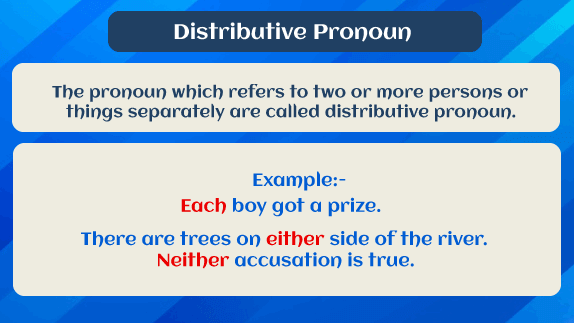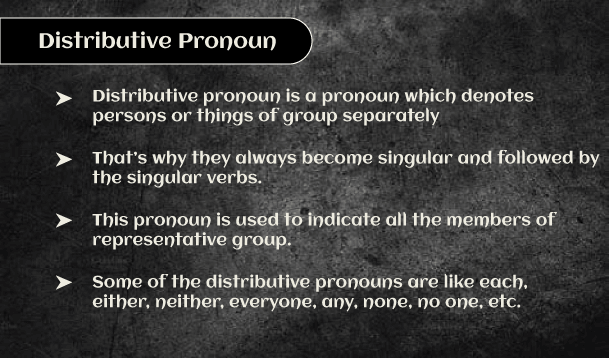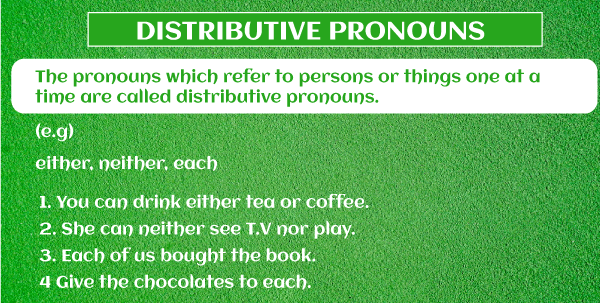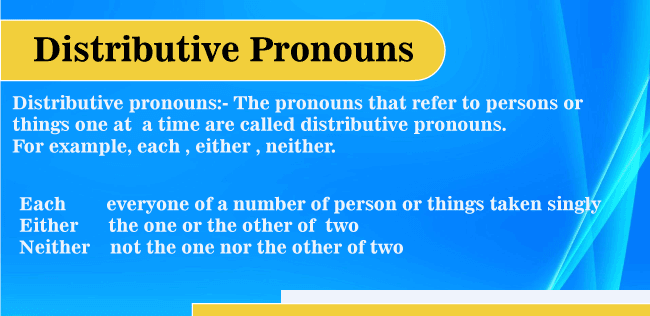Distributive PronounsDistributive pronouns are pronouns that disperse a verb's effects on more than one individual or item at a time. These pronouns refer to specific members or participants of the group. 
They relate to multiple nouns, but not as a group, but rather as individuals. The distributive pronouns encompass- each, either, and neither.
Explanation of Distributive PronounsA distributive pronoun is described as "a type of pronoun that refers to the members of the group individually instead of together or as a collection." They encompass the words "each, any, either, neither, and others." A distributive pronoun is a pronoun that represents individuals or items in a grouping independently, which is why they often become singular and are supported by singular verbs. This pronoun refers to all participants of the representative group. Each, either, neither, everyone, any, none, no one, and so on are some of the instances of distributive pronouns. 
Examples of Distributive PronounsLet us have a look at the examples of this type of pronoun:
This type of pronouns are often singular and hence require a singular verb(s) and singular possessive pronoun(s), although they can also be multiple. We understand that distributive pronouns refer to each individual member of the group. As a result, they are indeed regarded singular, and they follow single verb and singular possessive pronoun. Let us have a look at some of the examples: Each of the pupil have to finish their task by tomorrow. (INCORRECT) Each of the pupils has to finish his task by tomorrow. (CORRECT) Either of your companion forget their novel here every afternoon. (INCORRECT) Either of your companions forgets his novel here every afternoon. (CORRECT) Neither of the ladies acknowledged their fault. (INCORRECT) Neither of the ladies acknowledged her fault. (CORRECT) Distributive Adjectives Vs. Distributive PronounsIt is very crucial to comprehend the distinction amongst the distributive adjectives and distributive pronouns. Don't mix up distributive pronouns with distributive adjectives. Everyone knows that pronouns are employed to substitute nouns in order to decrease repetition. Pronouns and nouns, can become the subject(s) or object(s) of a phrase. While adjectives are utilized to qualify or alter nouns, they are placed directly before the noun in the form 'adjective + noun.' You should also keep in mind that a distributive pronoun is accompanied by a plural noun, whereas a distributive adjective is accompanied by a singular noun. However, because they relate to members of the group one at a time, both are regarded singular and require a singular verb and singular possessive pronoun. Neither of the children has eaten the chocolate. (Pronoun) Neither kid has eaten the chocolate. (Adjective) Either of the athletes is capable of winning the championship game. (Pronoun) Either athlete is capable of winning the championship game. (Adjective) Each of these bracelets has precious sea gems. (Pronoun) Each bracelet has natural sea gems. (Adjective) You can select either of the lady as your companion. (INCORRECT) (A plural noun comes after the distributive pronouns.) You can select either of the ladies as your companion. (CORRECT) Each painters has a distinct style. (INCORRECT) (Distributive adjectives are preceded by a singular noun and are accompanied by singular verbs.) Each painter has a distinct style. (CORRECT) KEYNOTES:

Rules Of the Distributive Pronouns with ExamplesSince they imply to individuals or objects one at a time. So, due to this fact each, either, and neither are known as distributive pronouns. It is important to remember that a distributive pronoun is almost all the time singular and must be accompanied by a singular noun and verb. Each new day is unique. (NOT Each new days are unique.) Either boy can do that. (NOT Either boys can do that.) Neither option is right. (NOT Neither options is right.) (NOT Neither options are right.) Please note the following: Plural nouns and the singular verbs are accompanied by each of, neither of, and either of. Each of the responses is true. (NOT Each of the response is true.) Neither of the boys can complete that task. (NOT Either of the boy can do that.) Either and neither must only be used while implying to two individuals or objects. When alluding to more than two individuals or objects, any, no one, or none should be used. None of the 3 options are right. (NOTE: Neither of the 3 options is right.) We invited a few pals, but none showed up. (NOT... but neither showed up.) You are free to select any of the 3 jerseys. (NOT You are free to select either of the 3 jerseys.) 
Each
How to use Distributive PronounsThere is a certain set of ways that make usage of Distributive Pronouns easy and right. Read on to know them; Note 1: Either denotes one of the two options. Neither is the negative of the other.Let us try see this through instances Each of the girls is beautiful. Either of the paths leads to the office. Neither of the boys was early. Note 2: The pronoun each may have 3 levels or the positions.Let us see this with the help of few instances Eachof the girls received a certificate. These girls eachreceived a certificate. These girls received hundred rupees. The third order is frequently placed after a number. Note 3: In the below- mentioned statements, each, either, and neither are adjectives, not the pronouns.Let us try and get this concept with the help of few egs. Each kid got a present. (each kid individually) There are plants on either side of the pond. (either side refers to both the sides) Neither allegation is true. (neither = Little bit of any one of the two) Distributive Pronoun ExamplesHere are some instances of distributive pronouns: The distributive pronouns have been highlighted in the following instances so that you can easily recognize them.

Thus, conclusively distributive pronouns considered members of the group individually and not combined as a group. Moreover, the uses, types, and forms of distributive pronouns have been explained for you. It is important to note that distributive pronouns can be tricky and tough to understand at times. So the ideal way to understand these is to practice as much as you can. You will see withing no time you will be able to use them easily.
Next TopicEmphatic Pronouns
|
 For Videos Join Our Youtube Channel: Join Now
For Videos Join Our Youtube Channel: Join Now
Feedback
- Send your Feedback to [email protected]
Help Others, Please Share










